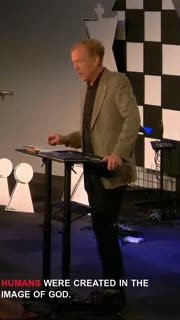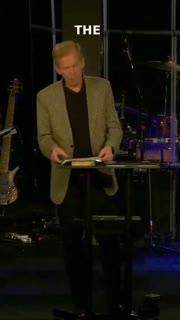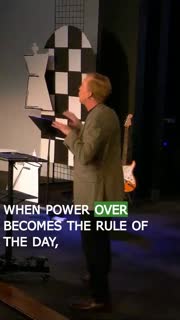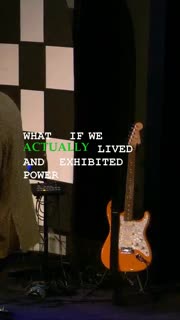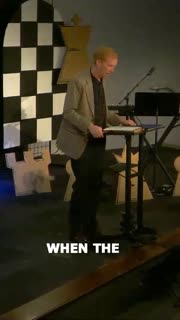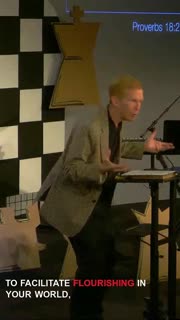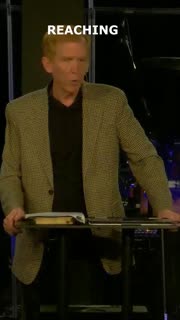Transforming Power: From Corruption to Servanthood
Devotional
Sermon Summary
Bible Study Guide
Sermon Clips
1. "The problem with power is that it does horrible things to otherwise decent kind everyday people and when that happens everyone pays the price so the question comes up is there any way to escape this because it seems to infect and affect everyone just like in tolken's trilogy is it better have some have suggested that perhaps nobody has power because none of us can be trusted with it." [37:03] (37 seconds)
2. "Humans were created in the image of God. And that image was centered, as we discussed last week, on having dominion over God's creation. That God created us to exercise power in wise discernment. Discerning dominion over His creation, so that we would reflect God's justice and God's love and God's wisdom into His creation. To do that requires power. In short, power was given for flourishing. God gives humanity power so that we can create a flourishing world." [39:47] (43 seconds)
3. "The temptation that we face, however, is to misuse power for our own personal benefit, for our own advantage, for our own private gain. This is the problem with power and control. And nowhere is this easier to see than in the world of power. The world of politics. Can I get an amen? Don't worry, we're not going to delve into politics today. We will get there in this series. Okay, so, you know, I'll make everyone mad at some point." [43:26] (43 seconds)
4. "We are all tempted to use power over, but something happens in the kingdom of power over. Something happens that we don't even realize, is that we cease to become image bearers of the generous and peaceful and loving God, and we begin to reflect the image of other little gods, status, reputation, wealth, influence, and all these things. And as we travel further down this road in the kingdom of power over, we find ourselves living our lives focused around something other than the creator God." [47:26] (60 seconds)
5. "When power over becomes the rule of the day, idolatry and injustice begin creeping into our lives, almost without noticing. This is the problem. We hoard resources. We oppress other people groups. We hold others in contempt because we don't agree with them or we think they're not, you know, the kind of people that they should be. And then Jesus comes along. And if you remember, he says, repent for the kingdom of God is here. It's a different kind of kingdom." [49:16] (44 seconds)
6. "What if we actually lived and exhibited power under instead of power over? And by the way, it's a little, uh, shameless plug here. Uh, one of the ways that we witness and testify to God's power and the transforming power of his love is this practice that the church has used since the beginning called baptism, where we essentially take, a public stand and say, here, here's my story and my testimony, right? I've been transformed by the love of God. His power under has transformed my life and I am signing up for Jesus kingdom of power under." [54:21] (40 seconds)
7. "When the opportunity presents itself, we can be ambassadors of the kingdom of power under. The wisdom writer in the Old Testament, in Proverbs 3, verse 27, makes this comment, do not withhold good from those to whom it is due when it is in your power to act. In other words, when you have access to power, relational power, political power, financial power, physical power, whatever that happens to be, when you have access to power, when it is within your power to act, he says, don't withhold good from those to whom it is due." [57:36] (48 seconds)
8. "What if you used the power of your words to facilitate flourishing in your world, in your family, in your workplace, in your classroom? What if you used your words to create flourishing for those you interact with? Maybe your spoken words, maybe your typed or texted words. Those who sit in the same classroom, work in the same company, those who live on your street, those who actually wait for it, might disagree with you on the important things about life, and economy, and politics, and politicians." [59:48] (41 seconds)
9. "Reaching your potential as an agent of flourishing in God's creation is even more important than reaching. And so I want to challenge you today. Will you sign on to Jesus' kingdom? The kingdom of power under that uses power for the reason it was intended to create flourishing in God's world." [01:03:35] (26 seconds)
Ask a question about this sermon
2. "Humans were created in the image of God. And that image was centered, as we discussed last week, on having dominion over God's creation. That God created us to exercise power in wise discernment. Discerning dominion over His creation, so that we would reflect God's justice and God's love and God's wisdom into His creation. To do that requires power. In short, power was given for flourishing. God gives humanity power so that we can create a flourishing world." [39:47] (43 seconds)
3. "The temptation that we face, however, is to misuse power for our own personal benefit, for our own advantage, for our own private gain. This is the problem with power and control. And nowhere is this easier to see than in the world of power. The world of politics. Can I get an amen? Don't worry, we're not going to delve into politics today. We will get there in this series. Okay, so, you know, I'll make everyone mad at some point." [43:26] (43 seconds)
4. "We are all tempted to use power over, but something happens in the kingdom of power over. Something happens that we don't even realize, is that we cease to become image bearers of the generous and peaceful and loving God, and we begin to reflect the image of other little gods, status, reputation, wealth, influence, and all these things. And as we travel further down this road in the kingdom of power over, we find ourselves living our lives focused around something other than the creator God." [47:26] (60 seconds)
5. "When power over becomes the rule of the day, idolatry and injustice begin creeping into our lives, almost without noticing. This is the problem. We hoard resources. We oppress other people groups. We hold others in contempt because we don't agree with them or we think they're not, you know, the kind of people that they should be. And then Jesus comes along. And if you remember, he says, repent for the kingdom of God is here. It's a different kind of kingdom." [49:16] (44 seconds)
6. "What if we actually lived and exhibited power under instead of power over? And by the way, it's a little, uh, shameless plug here. Uh, one of the ways that we witness and testify to God's power and the transforming power of his love is this practice that the church has used since the beginning called baptism, where we essentially take, a public stand and say, here, here's my story and my testimony, right? I've been transformed by the love of God. His power under has transformed my life and I am signing up for Jesus kingdom of power under." [54:21] (40 seconds)
7. "When the opportunity presents itself, we can be ambassadors of the kingdom of power under. The wisdom writer in the Old Testament, in Proverbs 3, verse 27, makes this comment, do not withhold good from those to whom it is due when it is in your power to act. In other words, when you have access to power, relational power, political power, financial power, physical power, whatever that happens to be, when you have access to power, when it is within your power to act, he says, don't withhold good from those to whom it is due." [57:36] (48 seconds)
8. "What if you used the power of your words to facilitate flourishing in your world, in your family, in your workplace, in your classroom? What if you used your words to create flourishing for those you interact with? Maybe your spoken words, maybe your typed or texted words. Those who sit in the same classroom, work in the same company, those who live on your street, those who actually wait for it, might disagree with you on the important things about life, and economy, and politics, and politicians." [59:48] (41 seconds)
9. "Reaching your potential as an agent of flourishing in God's creation is even more important than reaching. And so I want to challenge you today. Will you sign on to Jesus' kingdom? The kingdom of power under that uses power for the reason it was intended to create flourishing in God's world." [01:03:35] (26 seconds)

